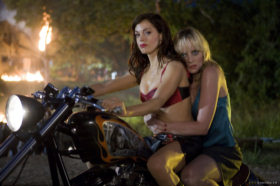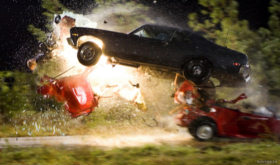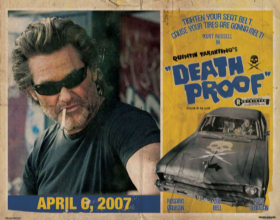Grindhouse is high concept at its highest, more than three hours of
homage to the grindhouse flicks of the seventies and late sixties.
A "grindhouse" was a local independent theater which made a living from
running the same kinds of B-movies which appeared in drive-ins, always as
double or triple features. These films were made with small budgets and a
small number of distribution prints which made the rounds from theater to
theater. By the time the prints arrived at the last sites in the circuit,
they were often damaged by wear, handling, censorship, and even outright
theft. Theater owners and projectionists would often snip out things they
liked, or things they had to snip out to meet local decency standards. Once
these cuts were made, a film was rarely restored. The print's migration
would continue "as is," and the film would get ever shorter and more
shop-worn. These films were normally the exploitation genres: Italian gialli,
soft-core porn, martial arts flicks, splatter and horror films, gearhead and
redneck movies, spaghetti westerns, blaxploitation efforts, women in prison
films, and so
forth. Occasionally a European art film with some nudity would sneak into
the circuit as well, much to the chagrin of theatergoers who had been lured
in by deceptively sensationalistic marketing. It wasn't just the art
films which could disappoint. Every single one of the films seemed to have a
great newspaper insert, a lurid trailer, and a sensational come-on poster,
but the actual films often disappointed in contrast to the sleazy promise of
their marketing campaigns.
Quentin Tarantino and Robert Rodriguez started with the idea that they
would make two of the movies that were promised by those posters, with each
director making his own film and the entire package to include a double
feature and fake trailers to other, similar films.
The two men chose to interpret the task in very different ways. Rodriguez
stuck with his original concept of delivering the kind of movie promised by
the trailers: sleazy, gory, gross, sadistic, and funny, with every element
exaggerated to wild, frenetic levels. His film, "Planet Terror" is basically
the ultimate zombie movie, and is just non-stop insanity. It lives in a word
of its own, somewhere between a parody of 70s exploitation, a refinement of
70s exploitation, and a typically mad Rodriguez movie like From Dusk 'Til
Dawn.
Tarantino went in a different direction. His segment, "Deathproof," is
about a stuntman who kills women with his tricked-up car, by engaging them
in crashes which he can survive but they can't. Since he stays sober and
attacks drunken female drivers, John Law lets him skate. Tarantino did not
parody 70s genre films or expand upon them. He simply made one of his own,
presumably using the logic that parody would be redundant. Unfortunately, he got hanged from the height of that concept.
Those movies often went on too long with too much talking, so he did that.
They often dropped plot threads, so he did that. They often ended without
wrapping up, so he did that. They often had incoherent plots, so he did
that, too. A real film insider will appreciate the intellectual honesty of
what he did, right down to the film stocks, the cameras, and the CGI-free
action.
Tarantino delivered exactly what he intended to, and what he did, he did
perfectly. Unfortunately, his concept is a bit too "inside" for average
audiences to appreciate. After all, a bad movie is a bad movie, whether one
makes it that way intentionally or unintentionally. QT might have benefited
from exaggerating the films of that time rather than merely duplicating
them. With all the problems, there are two elements which redeem the
Tarantino segment: a crazed performance by Kurt Russell as the murderous
stuntman, and dazzling car chase footage actually performed "old school," by
live actors on the road in real cars.
In short, Rodriguez delivered the movie that grindhouse marketing
promised but never delivered. He did a Robert Rodriguez movie as a parodic
riff on the films of the grindhouse era. Tarantino, on the other hand,
actually made a genuine grindhouse movie, albeit with better camera work on
the car stunts. If the complete film cost $53 million to make, Rodriguez
probably spent about $52.9 million of it.
Before the show begins, there is a fake trailer, directed by Rodriguez,
for a film called Machete. (I understand that Rodriguez has now decided to
make this film a reality as soon as he finishes the Sin City sequels.) In
between the two main features there are three more fake trailers directed by
three different directors: Rob Zombie, Eli Roth, and Edgar Wright. Although
the two main features are entertaining, the four trailers are, for my money,
the best part of the show. Every single one of them is hilarious from start
to finish, and each one riffs on a different element of period exploitation
marketing. Great stuff.
The total entertainment experience is excellent, with the only exception
being that Tarantino's segment takes a long time to develop, and the
beginning is long-winded in the extreme, which gives the three hour
presentation a big sag about two hours in. Given that most human bodies are
psychologically prepared to head for the exits after two hours, this is not
the perfect place to install a lull. Perhaps Tarantino's film should be
shorter, or perhaps it should have gone first, because I was dozing off a
bit in parts of Deathproof, but there's no way anybody could doze off during
Planet Terror.
I have to admit I would have been perfectly content to leave after Planet
Terror and the fake trailers, and that's exactly what I would do if I went
to see the film again. I would enjoy seeing those parts one more time, but
one view of Deathproof was enough for me. Given the lack of nudity, I
probably won't even watch it again when I get the DVD.
That's kind of a minor quibble. Tarantino did his own thing, and that's
cool because the package would have not worked as well if the two directors
had produced films which were too similar - and they are as different
as can be. And a quick scan of the reviews and IMDb comments reveals that
there were plenty of people who preferred the Tarantino segment!
Grindhouse is not a movie, or even two movies, but an experience. It's
the Rocky Horror of a new millennium. It's the kind of film that gets people
together in costume at midnight screenings so they can talk back to the
movie. It's the kind of thing that you should show in HD on your home
theater to your rowdiest friends, all of whom should be fueled by the
intoxicants of their choice. I reckon that would be an evening of
rip-roaring fun.





